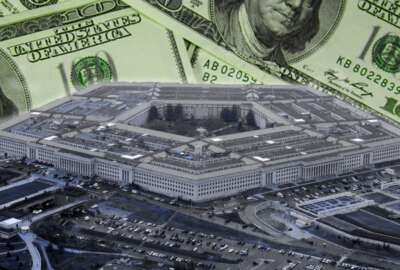Best listening experience is on Chrome, Firefox or Safari. Subscribe to Federal Drive’s daily audio interviews on Apple Podcasts or PodcastOne.
Federal civilian employees and active-duty members will see the first signs of the president’s payroll tax deferral next week, the military’s largest payroll provider and the Trump administration said Tuesday.
All major federal payroll providers are implementing the president’s payroll tax deferral for the second paycheck of the month, a senior administration official told Federal News Network Tuesday evening.
The payroll tax deferral is effective for civilian federal employees at the pay period ending Sept. 12, the Defense Finance and Accounting Service (DFAS) said in a series of frequently-asked-questions, which it posted over the weekend.
For active-duty military members, the payroll tax deferral is effective for their mid-month paycheck, DFAS said. Military members are paid twice every month. Pay day arrives for most active-duty members Sept. 15.
For most civilian workers, pay day falls on or around Sept. 18, though the exact timing may vary depending on whether an employee has direct deposit or receives a paper check.
The DFAS FAQs offer up a few more details on when the military’s largest payroll provider will process the tax deferral for its customers, consistent with the president’s Aug. 8 memo.
They also confirm what Federal News Network reported last week: federal civilian employees and military members of all branches are subject to the president’s payroll tax deferral, as long as their wages fall below a certain threshold.
DFAS handles payroll for much of the military and the Defense Department, as well as the Department of Veterans Affairs, Department of Health and Human Services, Energy Department, Executive Office of the President and others.
Both civilian employees and military members are not eligible to opt out of the president’s payroll tax deferral, DFAS said, confirming what some agencies told their employees last week. The deferral will happen automatically.
“The Office of Management and Budget directed all executive branch agencies to implement the tax deferral,” DFAS wrote in a series of FAQs for civilian employees and military members. “As such, no payroll providers, departments/agencies, or service members will be able to opt-in/opt-out of the deferral.”
Again, members of Congress made a plea to OMB for more information about the president’s payroll tax deferral for federal employees.
Sen. Chris Van Hollen (D-Md.), as well as Minority Leader Chuck Schumer (D-N.Y.), Susan Collins (R-Maine) and 20 other Senate Democrats and independents, urged the administration to give federal employees the opportunity to opt out.
“Federal workers and service members should not be used as pawns for a payroll tax scheme that many private sector employers are unlikely to join and where key questions remain unanswered,” the senators said Tuesday in a letter to OMB Director Russell Vought and Treasury Secretary Steven Mnuchin.
Rep. Don Beyer (D-Va.) was also highly critical of the impact the president’s payroll tax deferral would have on military families.
“Thanks to Donald Trump, military families will see their paychecks reduced in January,” Beyer said Tuesday in a statement. “The president’s order will give the illusion of pay increases until after the election, and then require service members to pay the money back with double tax withholding.”
To determine eligibility for the president’s payroll tax deferral, DFAS recommended employees check their leave and earnings statements (LES).
Civilian employees whose gross wages are less than $4,000 a pay period are subject to the payroll tax deferral.
Military members whose monthly basic pay is less than $8,666.66 are also eligible, DFAS said.
Employees and military members will need to pay back the deferred taxes starting next January. The DFAS FAQs suggest employees will pay those taxes back evenly from January through April 30, 2021, as opposed to repaying them through one lump sum.
In a Tweet, Sergeant Major of the Army Michael Grinston urged soldiers to set the temporary windfall aside for next year, when they’ll have to repay the deferred taxes.
In its guidance to customers, DFAS directed employees and military members to government financial readiness resources. Active-duty members can visit their installation’s Military and Family Support Centers to speak with a financial counselor, DFAS said.
Those who leave federal or military service in 2020 are still on the hook to repay deferred taxes at some point, though the logistics are murky.
“If you separate or retire in 2020 before the Social Security tax can be collected in 2021, you are still responsible for the Social Security tax repayment,” DFAS wrote in its FAQ section. “As more information becomes available on the collection of any deferred Social Security taxes, it will be posted here.”
In a notice to its military and civilian workforce, the Coast Guard said Friday those who separate or retire before the end of the year will have their deferred Social Security taxes collected from their final paychecks. The Coast Guard handles payroll for its own active-duty workforce.
Like many of the messages federal employees have received about the president’s upcoming payroll tax deferral, the DFAS FAQs are light on details. The provider, for example, said it would post additional information about the impact of the upcoming policy on employees’ W-2s for 2020 and 2021.
More details on employees’ repayment options and the possibility for interest and penalties are also forthcoming, DFAS said.
Copyright
© 2024 Federal News Network. All rights reserved. This website is not intended for users located within the European Economic Area.
